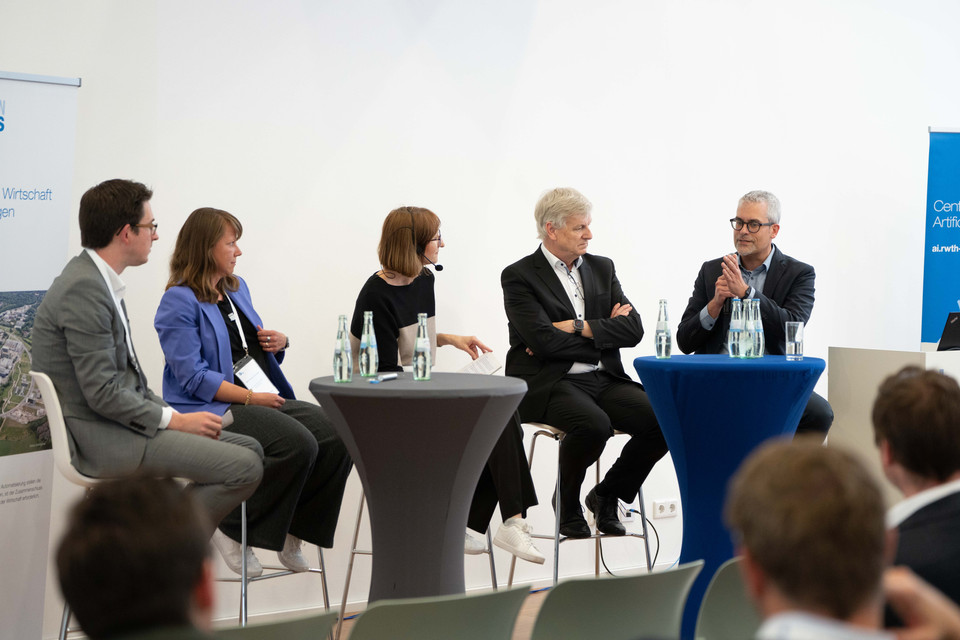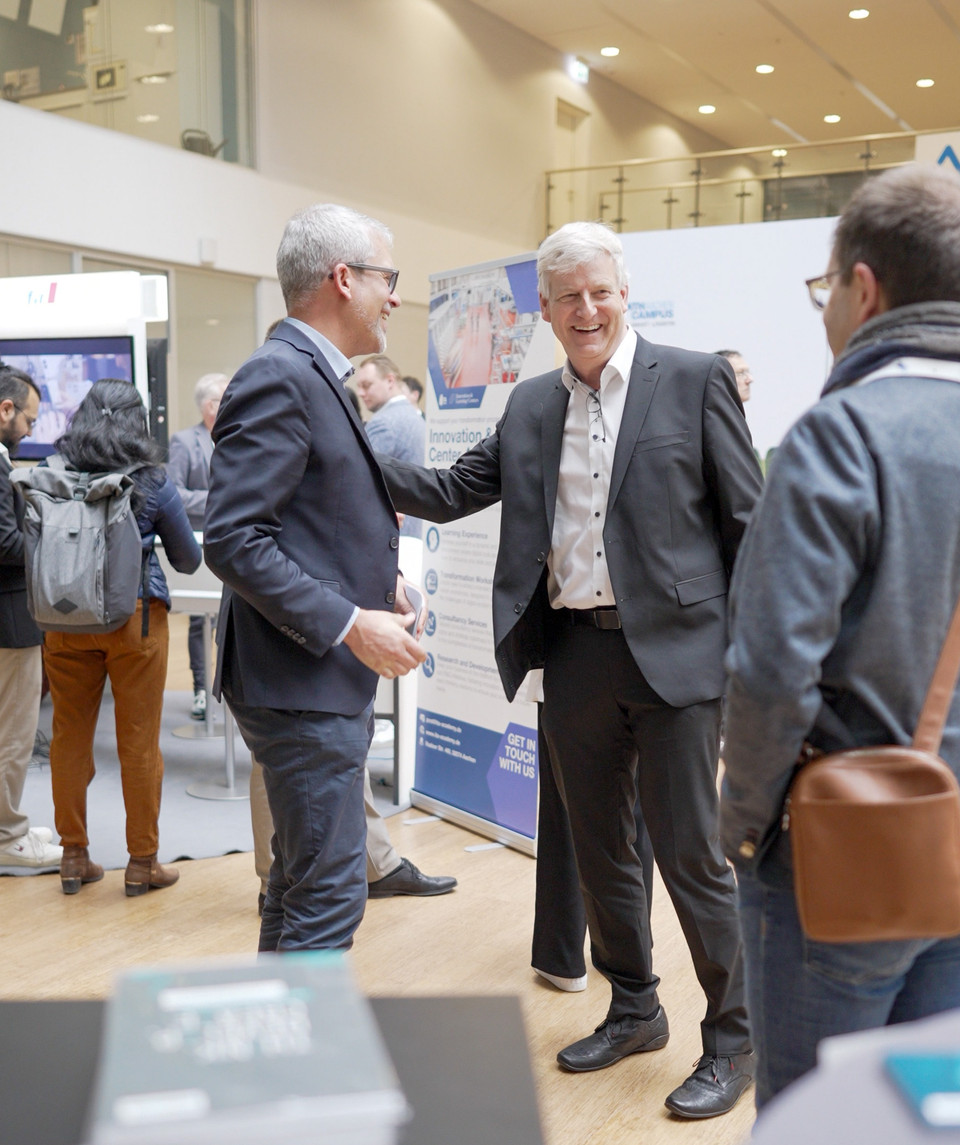Jun 2, 2025 Hannah Kuck
ShareLessons learned from the RWTH Industry AIxChange Event 2025
"If I have seen further, it is by standing on the shoulders of giants." – Isaac Newton
Monika Löber from the KI.NRW competence platform opened the closing panel discussion of the RWTH Industry AIxChange 2025 with this quote, thus picking up on the central theme of the event: knowledge transfer through collaboration.
As the main sponsor of this year's Aachen AI Week, we at INFORM were also there to send a clear message: Europe's AI future is being shaped where technological research and entrepreneurial implementation go hand in hand.
Research meets practice – live in Aachen
The spirit of innovation was palpable the moment visitors stepped into the light-filled atrium of the Smart Logistics Cluster on the RWTH Aachen Campus. On May 22, 2025, the event brought together leading minds from academia and industry with a clear goal: to foster exchange and bring AI innovations into real-world application.
The event was enriched by concrete insights and exciting use cases:
- One presentation showed how AI agents are already supporting management tasks today, for example by assisting employees with internal application processes.
- A keynote speech on corporate strategy in the AI age emphasized that it is not so much the mere purchase of AI technologies that is decisive for long-term competitive success, but rather the systematic promotion of trust, cooperation, and an innovation-friendly corporate culture.
- Another example demonstrated how AI is being used in assembly planning: an application analyzes synthetically generated image data to capture assembly processes and automatically generate instructions. This simplifies the onboarding of new employees and helps preserve valuable expert knowledge – a crucial advantage in times of skilled labor shortages.
A particularly valuable aspect was the personal exchange with experts from various RWTH centers and institutes, especially during the networking sessions where individual questions could be addressed directly.
INFORM on the podium: “Make, buy, or partner?”
As the highlight of the event, representatives from industry and research discussed the success factors of AI implementation in a lively panel discussion. Moderated by Monika Löber, INFORM CEO Dr. Jörg Herbers, Prof. Wil van der Aalst (RWTH Aachen & Celonis), Prof. Michael Riesener (RWTH Aachen), and Dr. Annika Lorenz-Kornfeld (REWE Digital) exchanged views on the topic "Make, Buy or Partner?"
It became clear how closely science and industry collaborate in the context of AI and how crucial strategic partnerships are for the successful implementation of AI initiatives. These partnerships make it possible to translate the latest research findings into practical applications, jointly address industry-specific challenges, and foster sustainable innovation through mutual learning.

What exactly can companies take away from the event? The following seven recommendations summarize the most important insights for AI practice.
7 insights for companies to successfully apply AI innovations
1. Use cooperation as a driver of innovation
Research institutions and companies can work closely together to put innovations into practice in a targeted manner. The so-called push-pull effect was a recurring theme, i.e., the interplay between scientific progress and practical challenges. A prime example of this is process mining, as Prof. van der Aalst explained: A small research project became an internationally established software category.
2. Establish a culture of change
Technology alone is not enough. Internal factors such as determination, the promotion of interdisciplinary teams, early trend observation, and the willingness to share data and clearly define problems are crucial for success.
3. Start pragmatically instead of planning for a long time
Just get started: It is easier to get started when companies engage in dialogue with research institutions, consultants, or technology providers. This creates a realistic picture of potential opportunities and challenges.
4. Secure top-down support
AI projects need backing from company management. Sustainable progress can only be achieved if management prioritizes AI as a strategic issue and provides resources.
5. Build interdisciplinary teams
Complex AI projects benefit from collaboration between different departments. When experts from the fields of practice and technology work closely together, solutions with real added value emerge – solutions that are both technically well-founded and application-oriented.
6. Ensure data quality as a foundation
A strong database is crucial. Many projects fail not because of the algorithm, but because of insufficiently available or unstructured data. Creating clean, accessible data early on lays the foundation for successful scaling.
7. Enable learning and allow mistakes
Innovation thrives in a culture that supports learning and experimentation. Pilot projects are allowed to make mistakes, as long as these are reflected upon and used as learning opportunities. Continuing education and an open error culture are key success factors.

Conclusion: From knowledge to action
The RWTH Industry AIxChange 2025 made it clear: Artificial intelligence in industry is no longer a topic for the future. It’s reality and a strategic competitive factor. INFORM CEO Dr. Jörg Herbers summed it up:
"Aachen combines cutting-edge research, industrial excellence, and a growing innovation network – the ideal place not only to discuss European AI, but to implement it."
— Dr. Jörg Herbers
Companies would be well advised to develop a clear AI vision now, expand their internal expertise, and network with partners such as research institutions, networks (e.g., KI.NRW), or technology companies such as INFORM. The key lies in a culture that builds bridges – between humans and machines, theory and practice, the present and the future.
In the spirit of Newton, we all stand "on the shoulders of giants" – now it is time to take advantage of this elevated perspective.
About our Expert

Hannah Kuck
Corporate Communications Manager
Hannah Kuck has been working as Corporate Communications Manager in Corporate Marketing at INFORM since August 2024. With a passion for creative and effective communication, she helps shape various areas of corporate communications - from press relations to content creation and storytelling.


